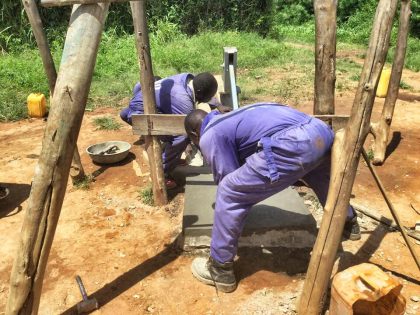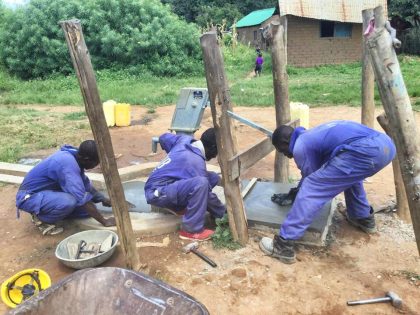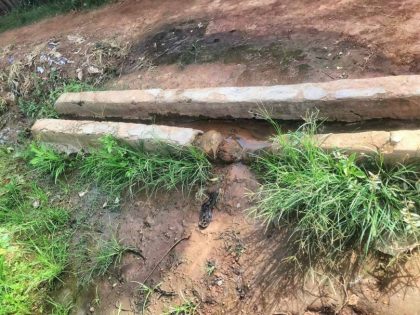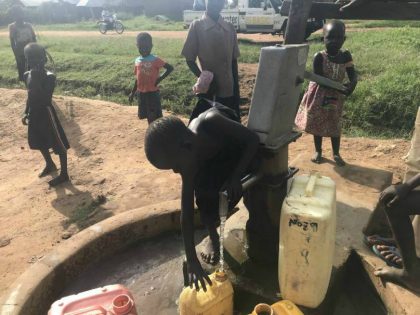Part 3 of Phase 4 in the South Sudan Well Rehab Program
The third set of 5 wells out of 20!
These 5 well repairs have been finished in the South Sudan Well Rehab Program Phase IV. Follow the link for an overview of the program.
Water Charity’s 20 South Sudan Relief Wells (with Conclusion Reports)
11. Amir Community
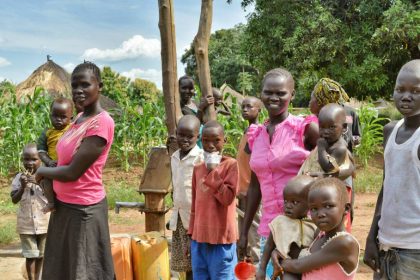
Location
Amir Community, Yei River State, South Sudan
GPS- N 04* 06.005 E 30* 42.191
Community Description
Amir community is located close to the Army Barracks. There are 600 households in Amir community and an estimated 3600 people.
Problem Addressed
With the Army Barracks close to this community, it became an area where conflict broke out at the beginning of 2017. Many people left the village to seek security and either hid in the bush or left for Uganda. During this time, the borehole was not used as often and pipes rusted.
Now that stability has returned to this area, so have the people. But the number one need upon their return is water, and the water from this well is now corroded because of the rusted pipes. Rose Tabu and her baby, Blessing were at the well when the well technicians were surveying what needed to be repaired. They are internally displaced and traveled four days from their home to seek security in this location last year.
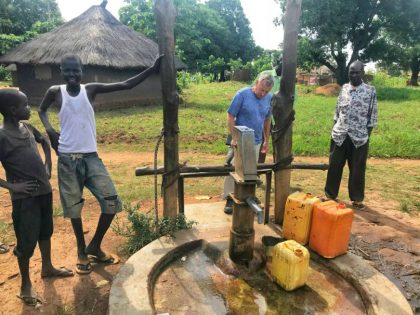
Project Impact
Like Rose, most everyone has experienced Trauma and are doing all they can to pick up the pieces of their life. They are tired but hopeful. Access to clean water is key to allowing them to have the capacity to heal and have a sense of normalcy. The Amir community well restoration will impact an estimated 3600 people.
Conclusion Report
The foundation of the Amir Community well was cracked contaminating the water pumped from the well. The head pump had to be removed to make minor repairs, and the team found a crack in the connecting rod. Worn parts were replaced and the foundation repaired in four hours.
Now community members such as Rose have access to clean, safe water. They will no longer have to walk long distances or wait in long lines to fill their jerry cans with water. The Amir community well restoration will impact an estimated 3600 people.
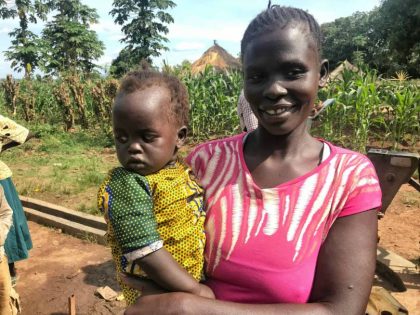
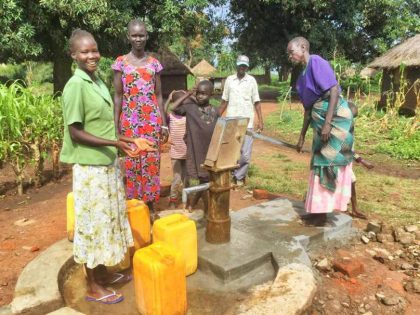
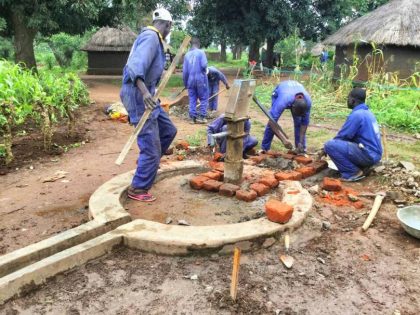
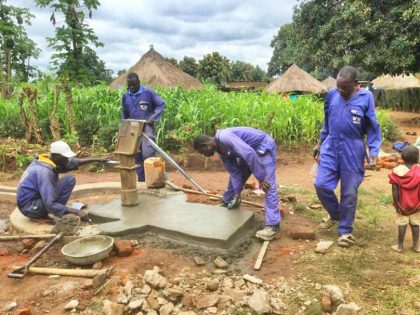
12. NTC
Location
NTC, Yei River State, South Sudan
GPS- N 04*06.604 E 30*43.728 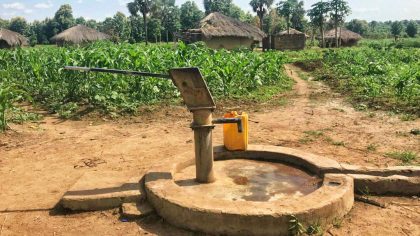
Community Description
NTC is a community with an estimated 500 people many of which are military personnel. It is a remote area located 5 miles from the center of Yei town. Recently about 200 people who were displaced joined this community. Security is heightened in this military area and to drive to this community, one must go through two checkpoints before entering.
Problem Addressed
The NTC well was restored two years ago in collaboration with the generosity of Water Charity donors. GI pipes were replaced as the old ones were corroded and pumped forth water with rust. When this area became the center of conflict in 2017, the well was abandoned for many months and was not cared for by the committee as many members left. Now that peace is realized in this community, people have returned, and the committee has been reestablished. They have reported that misuse of the well has caused damage to the pump and rust has once again set in as it was not used for an extended period. Metal bearings and rubbers will need to be replaced to allow the pump to function properly. This repair will only take a couple of hours to enable hundreds to have access to clean water once again. 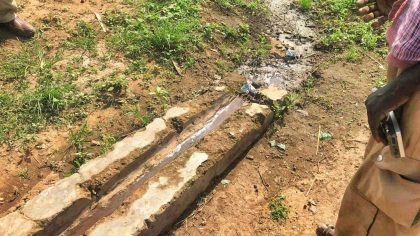
NTC community well currently serves an estimated 500. In May, when the Water is Basic team surveyed the borehole, the community members shared how they are suffering not only because of the broken well but because they are hungry.
They rely on their crops to feed their families and to earn an income, but between May and September, they will not have much food. As the team surveyed the well, they heard from community members who passionately shared their struggles with not only water but hunger. The mangos and coconuts are gone, and the corn has not been harvested. Mary, the mother of 6 and grandmother of 5, pointed to the greens on the ground and said that is what they are relying on for food.
Martin Marof is the chairman of NTC well. He said their committee now consists of three women and two men. They have carefully maintained the area around the borehole and cleaned much of the overgrowth around it since the last repair. When the borehole was first drilled, there was a protective fence around the well that limited the range of movement for the hand pump. The structure will be replaced when the well is restored, and they are not struggling to access food and water. For now, that is their priority. 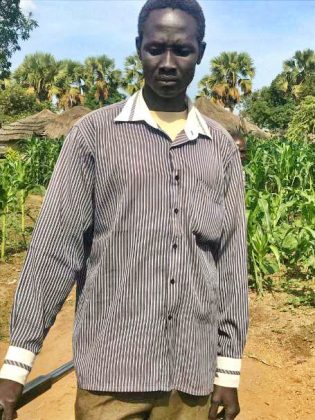
Project Impact
The well-restored at NTC will provide relief for the community members that are struggling with their basic needs. Water from this well will serve an estimated 500 people.
Conclusion Report
As expected, the repair of the NTC community well only took a couple of hours but will have a long-lasting positive effect on the community. As the dry season approaches in November, the community will not only have access to drinking water but will be able to water the crops that are vital to their livelihood.
Many of the families that use the well are connected to military personnel. Because of the civil war, these families lived in fear for their loved ones and their community. The restoration of this well will meet their physical needs so they can, in turn, focus more on their mental and emotional healing.
The water committee has been re-established, and now that the well is fixed, they have committed to building the fence around the structure and maintaining the land around it. They are a hard-working community with many crops to attend. The estimated 500 people of NTC community will have less stress in their work, improved health, and a better sense of wellbeing with access to clean water.
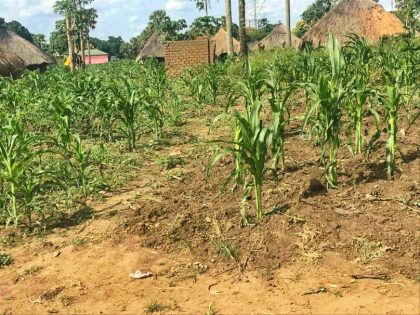
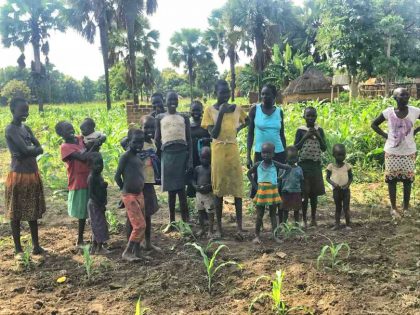
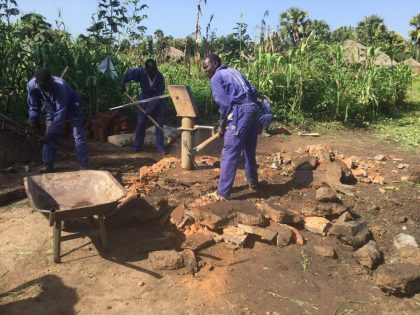
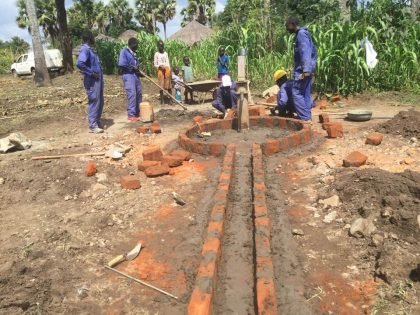
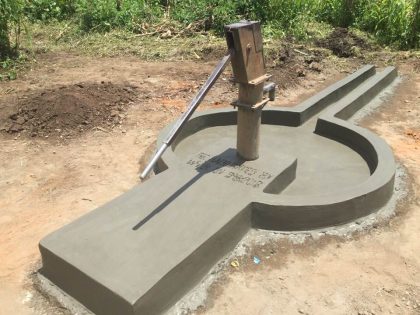
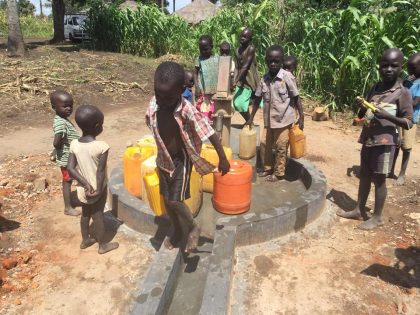
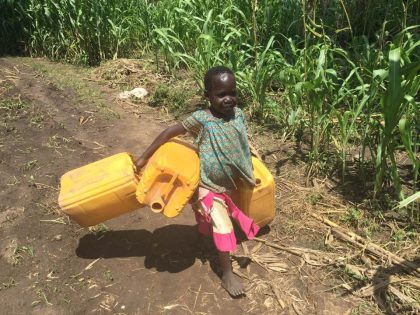
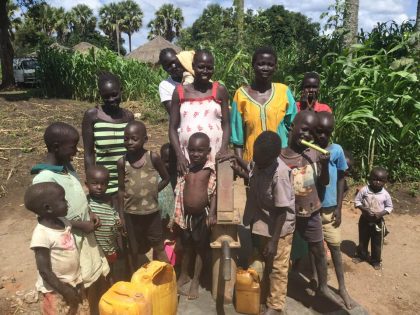
13. Mahat 1
Location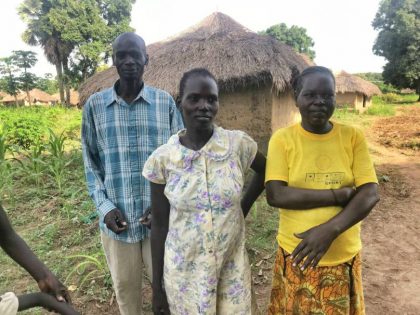
Mahat 1, Yei River State, South Sudan
GPS- N 04* 05.456 E 30* 41.684
Community Description
Mahat 1 is a remote village located 5 miles from the center of town in Yei. There are 80 households in the Mahat 1 community, and they rely on their crops to support their families.
Problem Addressed
When the crisis broke out in Yei River State in 2017, the neighboring community, Kembe became the subject of conflict. All of the families fled for security and the members of Mahat 1 welcomed them like family. During such traumatic times, everyone is willing to share their homes and their resources to survive.
While the Kembe community members have resettled back to their village, their well was damaged and they continue to use the well at Mahat 1. With 100 households in Kembe and 80 in Mahat 1, this well serves an estimated 1,080 people on a regular basis.
Mary is one of six women on the eleven-member well committee. She said that every morning, the water that is pumped from their well is red with rust. Many continue to use this water as it is the quickest and easiest to get to without having to pay fees. Others go to the neighboring Mahat well which is also beginning to show signs of damage because of overuse. 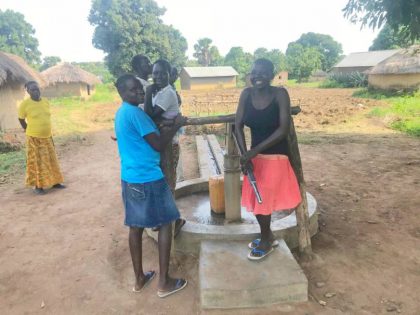
Mary chooses to continue to use this well water for drinking, cooking, washing and for watering her crops. She must take the time to boil the water each day that she sets aside for drinking and cooking. The line at the neighboring Mahat well merely is too long for her to wait with her children when Mary must use her time to tend to her crops and gather food for her family to eat. She also cannot afford to pay the 20 SS pounds per month that are required to use the neighboring well.
Project Impact
The three wells that supply the communities of Kembe, Mahat 1 and Mahat, are damaged. All three villages are struggling to find clean water sources. The repair of Mahat 1 will allow the 80 households of Mahat and 100 households of Kembe to have clean, freshwater. They will no longer have to wait in the long lines at the neighboring Mahat well and pay fees that they cannot afford. The 1,080 community members will have a higher capacity to tend to their crops and do more than merely survive.
Conclusion Report
The well technicians met with members of the Mahat 1 well committee while making the repairs to the well. The team replaced rusted GI pipes and repaired the base of the well, but the stressed to the committee that a structure must be built around the pump for it to be maintained. With the ability to lock the handpump during certain times a day, they will be able to ensure proper use and handling of the hand pump to eliminate future damage.
The restored well will serve the 80 households that live in the community as well as 100 households that live in the neighboring Kembe community. It has been decided that for now, they will not charge the Kembe community members a fee for usage of the well, as all understand the severe economic strain coming out of the conflict. The committee members agreed that once the Kembe community well was repaired, they will resume charging an agreed upon fee to go towards the future upkeep of the well and the surrounding land.
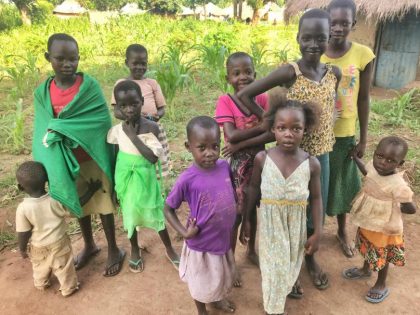
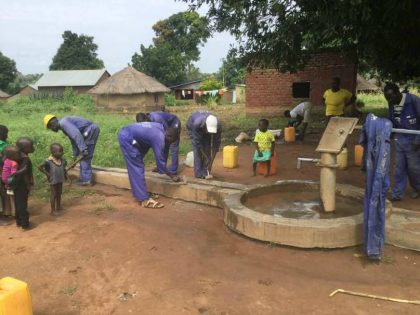
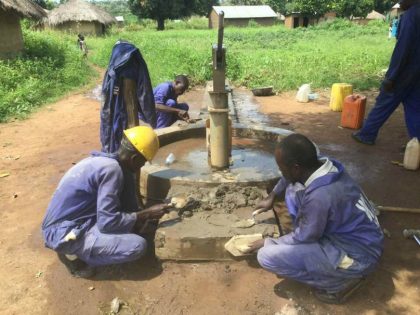
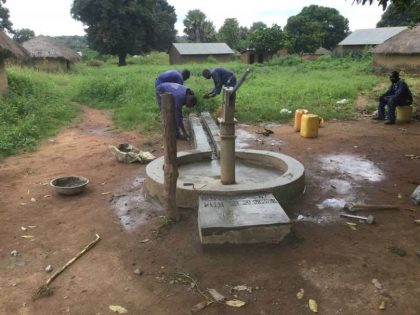
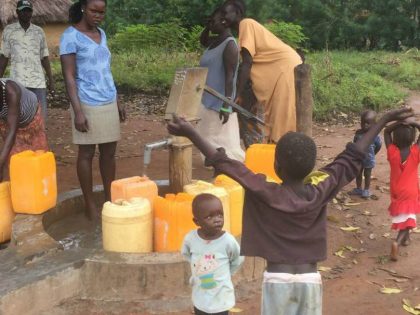
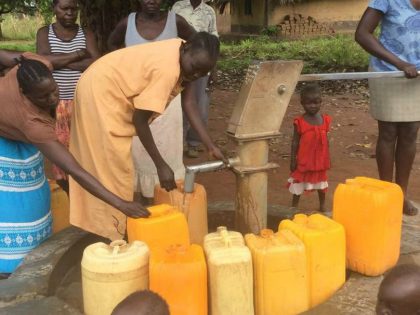
14. Mahat
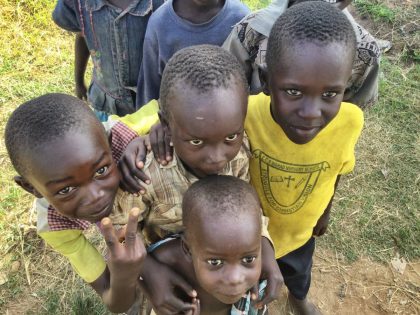 Location
Location
Mahat, Yei River State, South Sudan
GPS- N 04*05.708 E 30* 41.287
Community Description
Mahat is a remote village located 5 miles from the center of town in Yei. There are 200 households in the Mahat community, and they rely on their crops to support their families.
Problem Addressed
When the crisis broke out in Yei River State in 2017, the community of Kembe became the subject of conflict. All of the families fled for security, and many went to the neighboring village of Mahat 1.
When the crisis broke out in Yei River State in 2017, the community of Kembe became the subject of conflict. All of the families fled for security, and many went to the neighboring village of Mahat 1.
While the Kembe community members have resettled back to their village, their well was damaged and they continue to use the well at Mahat 1. The damaged well in the Kembe village and the rusty water from the Mahat 1 well have forced the members of those two communities to use this well at Mahat or seek water from a nearby pond.
Each well has a committee to manage the maintenance and oversight of the well. They also decide upon fees to charge per month to assist with the upkeep of the borehole and the surrounding area. While many communities are not charging fees during this impossible economic period in South Sudan, the members of Mahat continue to charge 20 SS pounds. 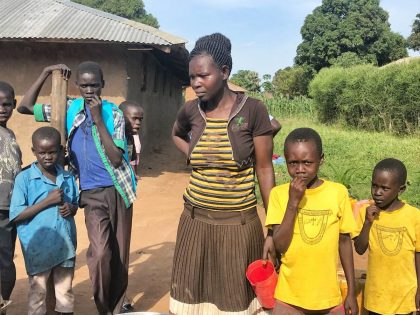
Rose Awate is a member of the well committee, and she said that if someone needs water and they cannot pay, there is grace. They are still operating in survival mode, and often, people pay what they can. Rose said the crops they rely on for income are suffering, and the corn is not ready for harvest. The 20 SS pounds they are charging per month is one of the only sources of revenue for the community. Part of this is set aside to assist with any needed repairs.
Rose said to manage the growing crowd that uses the well, they have a numbering system. If you pay fees at the beginning of the month, a number is put on your jerry can. The first one to pay gets a number 1 marked on the container, and that jerry can is first in line each day that month at the well. So those that pay, wait less time in line for their water.
With the overuse of the well, there are necessary repairs to be made. It has become increasingly hard to use the hand pump, and it must be pumped for about 5 minutes before the water even begins to flow. With so many people waiting to use the well, many have chosen not to wait and are resorting to getting their water from the nearby pond. With the rainy season, it increases the risk of cholera and other waterborne diseases.
Project Impact
There are 100 households in Kembe, 80 in Mahat 1, and 200 in Mahat. The Mahat well restoration project will serve an estimated 2,280 people on a regular basis plus the many people that use it each day as they are traveling through this community. It will eliminate the risk of waterborne diseases for those getting water from the nearby pond, and it will give community members more time to focus on their crops to earn a living.
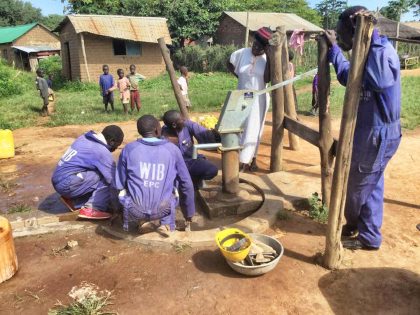 Conclusion Report
Conclusion Report
With the restored Mahat well, community members no longer have to wait for long periods of time for water to trickle out of the pump. This means less time waiting in line for water and more time tending to crops, going to school or caring for families.
The restored well will serve the estimated 90 households of Mahat. The numbers increase daily as people return home with the end of the civil war. The community members of Mahat 1 now have a working well and no longer share the Mahat well. But because of surrounding communities that still lack clean water, many outside of this community visit the well daily.
The well committee has decided to continue to use the numbering system and charge 20 SS pounds as it worked well for them during the conflict.
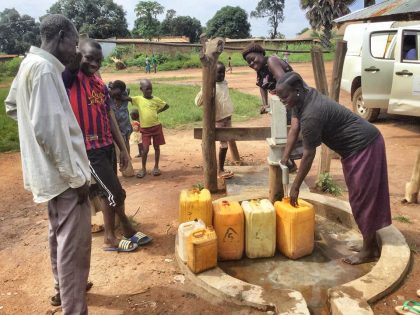
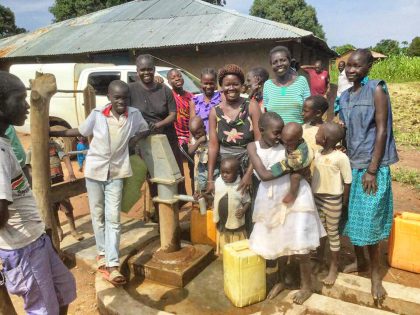
15. Dar Salaam
Location
Dar Salaam, Yei River State, South Sudan 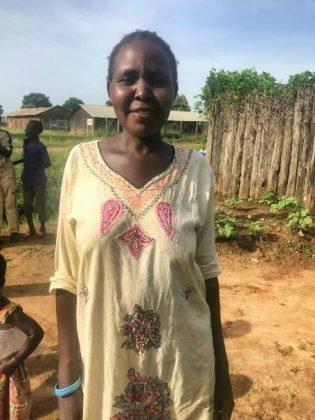
GPS- N. 04* 05.860. E. 30* 41.145
Community Description
50 families reside in the community of Dar Salaam. It is along the main stretch of the road leading into the city center of Yei. Daily, hundreds of people travel through Dar Salaam as they go into the city located 2 kilometers from the well site.
Problem Addressed
The borehole at Dar Salaam was first drilled in January of 2010. Over the course of 8 years, there has been wear and tear as to be expected, and many parts need to be replaced. The water that flows from the pipes is red for the first 5 minutes of pumping due to pipes that have corroded. The hand pump is hard to use and takes 10 minutes of pumping before water surfaces.
The platform of the borehole needs to be repaired for the run-off water to drain correctly. This water is used to irrigate their crops and currently pools into stagnant puddles constantly in need of cleaning up.
Rita Kiko has eight children ranging in age from ten to thirty. Her days are full as they are spent gardening and fetching water while caring for her children and grandchildren. Rita says it takes 10 jerry cans a day to meet the needs of her family. She continues to fill some of the jerry cans from the corroded Dar Salaam well but now prefers to walk and get fresh water from the market where she must pay 50 pounds per month. She cannot afford to fill all ten jerry cans at the marketplace where she must wait in a long line, only the ones used for drinking and cooking. She continues to struggle with the difficult hand pump to get water for cleaning and other necessities from the Dar Salaam well.
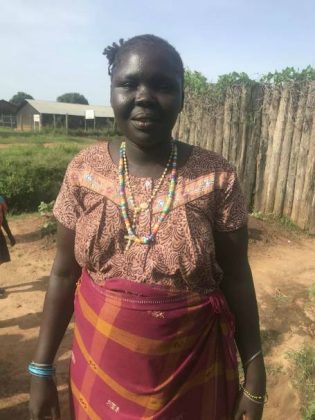
Mary has four children and must fill seven jerry cans a day to meet the needs of her family. Her story is similar to Rita’s, but with three out of her four children in school, she cannot afford to pay for the water in the marketplace most months as she struggles to pay 500 SSP per child per month in school fees. To earn this money, Mary cultivates vegetables in the market and says with the added expenses, she is no longer able to purchase sugar and salt that she prefers to use for cooking.
Project Impact
The well restoration project at Dar Salaam will serve the 50 as well as those who once used the well on a daily basis traveling along the road to and from the market. An estimated 1000 people will benefit from this repair.
Women like Mary and Rita will have much more time in their day to cultivate their crops and care for their children by not having to wait in long lines in the market. Their added financial burden will be lifted as the money they make selling vegetables will no longer be used for water, but for school fees and other necessities.
Conclusion Report
This was an extensive repair to the foundation of the Dar Salaam well. The team broke down the old foundation and constructed a new one with bricks and cement allowing the water to flow properly and not to contaminate the well water. Rubber bearings and other corroded parts were replaced allowing clean, fresh water to flow when pumped immediately.
This project serves 50 households as well as those who travel along the road to and from the market. An estimated 1000 people will benefit from this repair.
Women like Mary and Rita will have much more time in their day to cultivate their crops and care for their children by not having to wait in long lines in the market. Their added financial burden will be lifted as the money they make selling vegetables will no longer be used for water, but for school fees and other necessities.
